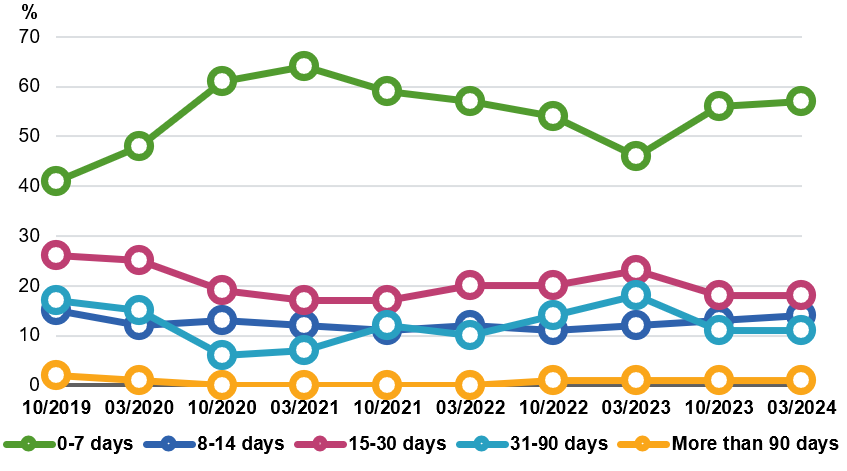Amendments to care guarantee speeds up access to doctor's appointments in particular – the two-week maximum period is realised increasingly
Amendments to the care guarantee last autumn have sped up access to physician's appointments in particular, says THL's recent statistical report. According to the report, in March 2024, patients were admitted to non-urgent outpatient medical care in primary healthcare within two weeks - and even within a week - notably more often than in March 2023.
In March, 71 per cent of doctor's appointments took place within 14 days of the assessment of the need for treatment, whereas the corresponding figure for the previous year was 58 per cent. 57% of the appointments took place within a week, compared with 46% the year before.
"To speed up access to treatment, the wellbeing services counties have developed their activities with such things as the use of digital services, and team and personal physician models. It is positive that the continuity of treatment will also improve in both models," says Tiina Hetemaa, Evaluation Manager at THL.
Relaxation of the care guarantee likely to increase differences in access to care
Legislation on the maximum periods for access to non-urgent care in public primary healthcare was amended to be stricter on 1 September 2023, and several maximum periods entered into force.
The care guarantee for primary healthcare is 14 days or three months and for oral health care it is four months. The maximum period of three months applies to certain separately mentioned treatment events.
The treatment event related to access to treatment must be for a licensed healthcare professional, such as a physician, nurse or practical nurse.
In its spring spending limits discussion, the Government proposed relaxing the 14-day care guarantee to 3 months. In the case of oral healthcare, the time limit will be relaxed to 6 months.
"Unfortunately, differences in access to treatment are likely to increase. This is a clear downgrade of services from the perspective of clients. As self-administrative regions, wellbeing services counties can certainly continue to make an effort to facilitate access to treatment that is as smooth and fast as possible," Hetemaa states.

Most appointments were to nurses and public health nurses
In March 2024, 91 per cent of outpatient care appointments in primary healthcare took place within 14 days, including not only doctors but also other professionals.
The majority of appointments, or 72%, were made to nurses and public health nurses. 95% of these were realised in two weeks and 90% already in one week.
According to legislative amendment that entered into force in September, a doctor's follow-up visit must take place within a week if the first appointment was with someone other than a physician. 76% of doctor's follow-up appointments took place within the maximum time limit.
The maximum waiting period of three months remained unchanged for some appointments. These include the first visit to rehabilitation services and services that promote health and welfare. 99% of these took place within the maximum time limit.
"In summary, nearly all non-urgent primary healthcare patients are treated within three months at the latest, regardless of their case," says Tiina Marttila, Senior Planning Officer at THL.
Access to dentists appointments has also sped up slightly
In March 2024, access to dentists' appointments was also a little faster than in spring 2023.
93% of non-urgent dentist visits took place within four months and 85% within three months of contact by the client and the assessment of the need for treatment.
Unlike other professionals, waiting times to treatment by oral hygienists had gotten slightly slower compared to what it was a year ago.
Comprehensive access to treatment data has not yet been obtained on the maximum periods that entered into force in September
The amendment, which entered into force in September, also required the wellbeing services counties to make changes in the recording of data.
Only three wellbeing services counties and Helsinki were able to record all the maximum periods required by the legislative amendment in all patient information systems by March.
"A new amendment to the Care Guarantee Act planned by the Government challenges recording in wellbeing services counties, as changes to information systems and their introduction in wellbeing services counties are partly implemented with a delay. It may be that not everyone has even implemented the previous changes yet, while the law is already changing again", Marttila says.
Regional information is available from THL's reports
Up-to-date information on admission to treatment is available in THL’s database reports. The information in the reports is organised by Regional State Administrative Agency, wellbeing services county and operating unit. The information is updated every month.
Service provider-specific quality reports on access to care are available for the examination of the quality and coverage of access data. Instructions are also available on recording data and using the reports.
Database reports, quality reports and recording instructions on access to primary health care (In Finnish)
The report includes non-urgent appointments preceded by a healthcare professional's assessment of the need for treatment. Appointments refer to visits or remote services for healthcare professionals.
Access to treatment in specialised medical care
The statistical report on access to specialised medical care will be published later in June on THL's website. The monitoring of access to specialised medical care and legislation differ from that of primary health care.
Access to treatment in specialised medical care (In Finnish)
Source
Access to primary health care in spring 2024 (In Finnish)
More information
Any enquiries concerning the statistical report should as a rule be sent to the shared email address avohilmo(at)thl.fi
Tiina Marttila (statistical report)
Senior Planning Officer
Tel. +358 29 524 8533
[email protected]
Raimo Mahkonen (statistical report)
Senior Planning Officer
Tel. +358 29 524 7669
[email protected]
Tiina Hetemaa (status of access to treatment in wellbeing services counties)
Evaluation Manager
THL
Tel. +358 29 524 7903
[email protected]
Ulla Harjunmaa (dental care)
Senior Dentist
THL
Tel. +358 29 524 7375
[email protected]



